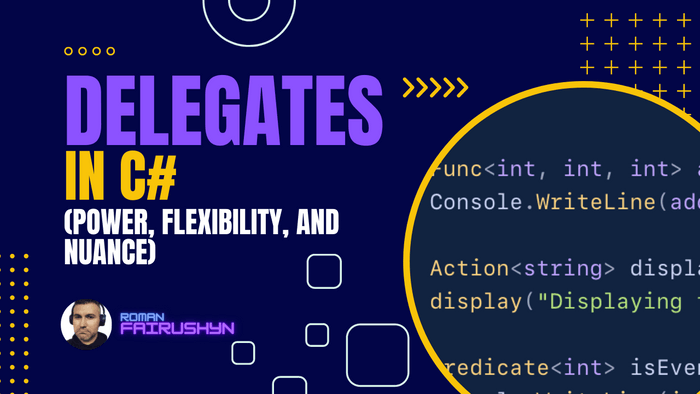Delegates in C#
Power, Flexibility, and Nuance
3 min read · — #csharp-interview#middle-specialist#delegates
Harness the potential of delegates and understand why they're more than just function pointers. This deep dive is perfect for developers looking to understand the intricacies and implications of using delegates in C#.
Delegates in C# are more than just a fancy way to reference methods. They are tools of abstraction, dynamism, and flexibility, enabling patterns that would be cumbersome or downright impossible with standard method calls. But with great power comes responsibility: delegates, if misused, can make code less readable and more complex. Let's delve deep.
The Essence of Delegates
At a basic level, a delegate is a type-safe reference to a method. It ensures that the method's signature matches its declaration.
// Declaration
public delegate void SimpleDelegate();
// Implementation
public void DisplayMessage()
{
Console.WriteLine("Delegate Basics!");
}
// Usage
SimpleDelegate delInstance = DisplayMessage;
delInstance(); // Outputs: "Delegate Basics!"Why Not Direct Method Calls?
So, why use a delegate instead of invoking a method directly?
Decoupling and Abstraction
Delegates allow for a separation between the definition of a method and its invocation. You can switch methods at runtime without changing the invocation logic.
public void GreetMorning() { Console.WriteLine("Good Morning!"); }
public void GreetEvening() { Console.WriteLine("Good Evening!"); }
SimpleDelegate greetDelegate;
if (DateTime.Now.Hour < 12)
greetDelegate = GreetMorning;
else
greetDelegate = GreetEvening;
greetDelegate(); // Dynamically decides which method to call.Dynamic Behavior
Dynamically determine which method to invoke, making code adaptive.
Multicast Capability
Invoke multiple methods from a single delegate invocation.
public delegate void LogDelegate(string message);
public void LogToConsole(string message) { Console.WriteLine(message); }
public void LogToFile(string message) { /* Logic to write to a file */ }
LogDelegate logger = LogToConsole;
logger += LogToFile;
logger("This will log both to console and file.");Foundation for Design Patterns
Frameworks and patterns, like Observer or Callbacks, heavily rely on delegates for dynamic behavior.
Functional Paradigms
Treat methods as first-class entities, enabling richer programming paradigms.
public delegate int MathOperation(int a, int b);
public int Add(int a, int b) { return a + b; }
public int Multiply(int a, int b) { return a * b; }
MathOperation operation = (DateTime.Now.Hour < 12) ? Add : Multiply;
int result = operation(5, 5); // Dynamic behavior based on time!The Power Trio: Func, Action, Predicate
These built-in delegates greatly simplify method references.
Func<int, int, int> add = (a, b) => a + b;
Console.WriteLine(add(3, 4)); // Outputs: 7
Action<string> display = msg => Console.WriteLine(msg);
display("Displaying through delegate!"); // Outputs the message
Predicate<int> isEven = num => num % 2 == 0;
Console.WriteLine(isEven(6)); // Outputs: TrueConclusion
Delegates in C# offer a blend of power and flexibility. While they introduce a layer of abstraction and some overhead, the benefits—decoupling, dynamic invocation, multicast capability, and support for functional paradigms—make them indispensable in many scenarios. However, judicious use is crucial to maintain readability and avoid unnecessary complexity.
Whether preparing for an interview or architecting a solution, understanding the power and pitfalls of delegates is a vital skill in a C# developer's arsenal. Embrace them, but wield them wisely.
Further Reading
- Delegates (C# Programming Guide)
- Using Delegates (C# Programming Guide)
- Delegates with Named vs. Anonymous Methods (C# Programming Guide)
- How to combine delegates (Multicast Delegates) (C# Programming Guide)
- How to declare, instantiate, and use a Delegate (C# Programming Guide)
- Action
Delegate - Func
Delegate - Func, Action And Predicate Delegates In C#
